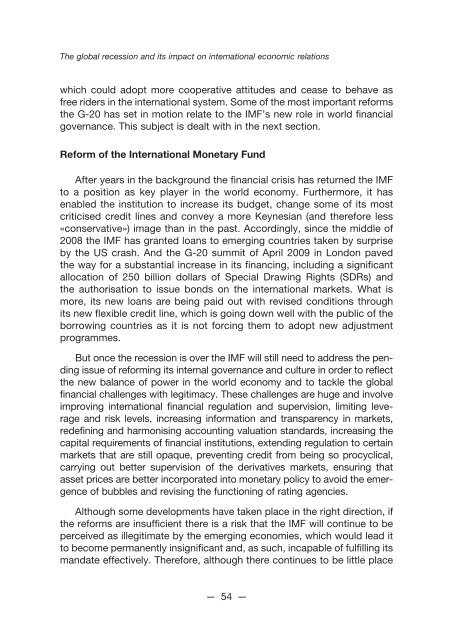Strategic Panorama 2009 - 2010 - IEEE
Strategic Panorama 2009 - 2010 - IEEE
Strategic Panorama 2009 - 2010 - IEEE
You also want an ePaper? Increase the reach of your titles
YUMPU automatically turns print PDFs into web optimized ePapers that Google loves.
The global recession and its impact on international economic relations<br />
which could adopt more cooperative attitudes and cease to behave as<br />
free riders in the international system. Some of the most important reforms<br />
the G-20 has set in motion relate to the IMF’s new role in world financial<br />
governance. This subject is dealt with in the next section.<br />
Reform of the International Monetary Fund<br />
After years in the background the financial crisis has returned the IMF<br />
to a position as key player in the world economy. Furthermore, it has<br />
enabled the institution to increase its budget, change some of its most<br />
criticised credit lines and convey a more Keynesian (and therefore less<br />
«conservative») image than in the past. Accordingly, since the middle of<br />
2008 the IMF has granted loans to emerging countries taken by surprise<br />
by the US crash. And the G-20 summit of April <strong>2009</strong> in London paved<br />
the way for a substantial increase in its financing, including a significant<br />
allocation of 250 billion dollars of Special Drawing Rights (SDRs) and<br />
the authorisation to issue bonds on the international markets. What is<br />
more, its new loans are being paid out with revised conditions through<br />
its new flexible credit line, which is going down well with the public of the<br />
borrowing countries as it is not forcing them to adopt new adjustment<br />
programmes.<br />
But once the recession is over the IMF will still need to address the pending<br />
issue of reforming its internal governance and culture in order to reflect<br />
the new balance of power in the world economy and to tackle the global<br />
financial challenges with legitimacy. These challenges are huge and involve<br />
improving international financial regulation and supervision, limiting leverage<br />
and risk levels, increasing information and transparency in markets,<br />
redefining and harmonising accounting valuation standards, increasing the<br />
capital requirements of financial institutions, extending regulation to certain<br />
markets that are still opaque, preventing credit from being so procyclical,<br />
carrying out better supervision of the derivatives markets, ensuring that<br />
asset prices are better incorporated into monetary policy to avoid the emergence<br />
of bubbles and revising the functioning of rating agencies.<br />
Although some developments have taken place in the right direction, if<br />
the reforms are insufficient there is a risk that the IMF will continue to be<br />
perceived as illegitimate by the emerging economies, which would lead it<br />
to become permanently insignificant and, as such, incapable of fulfilling its<br />
mandate effectively. Therefore, although there continues to be little place<br />
— 54 —

















